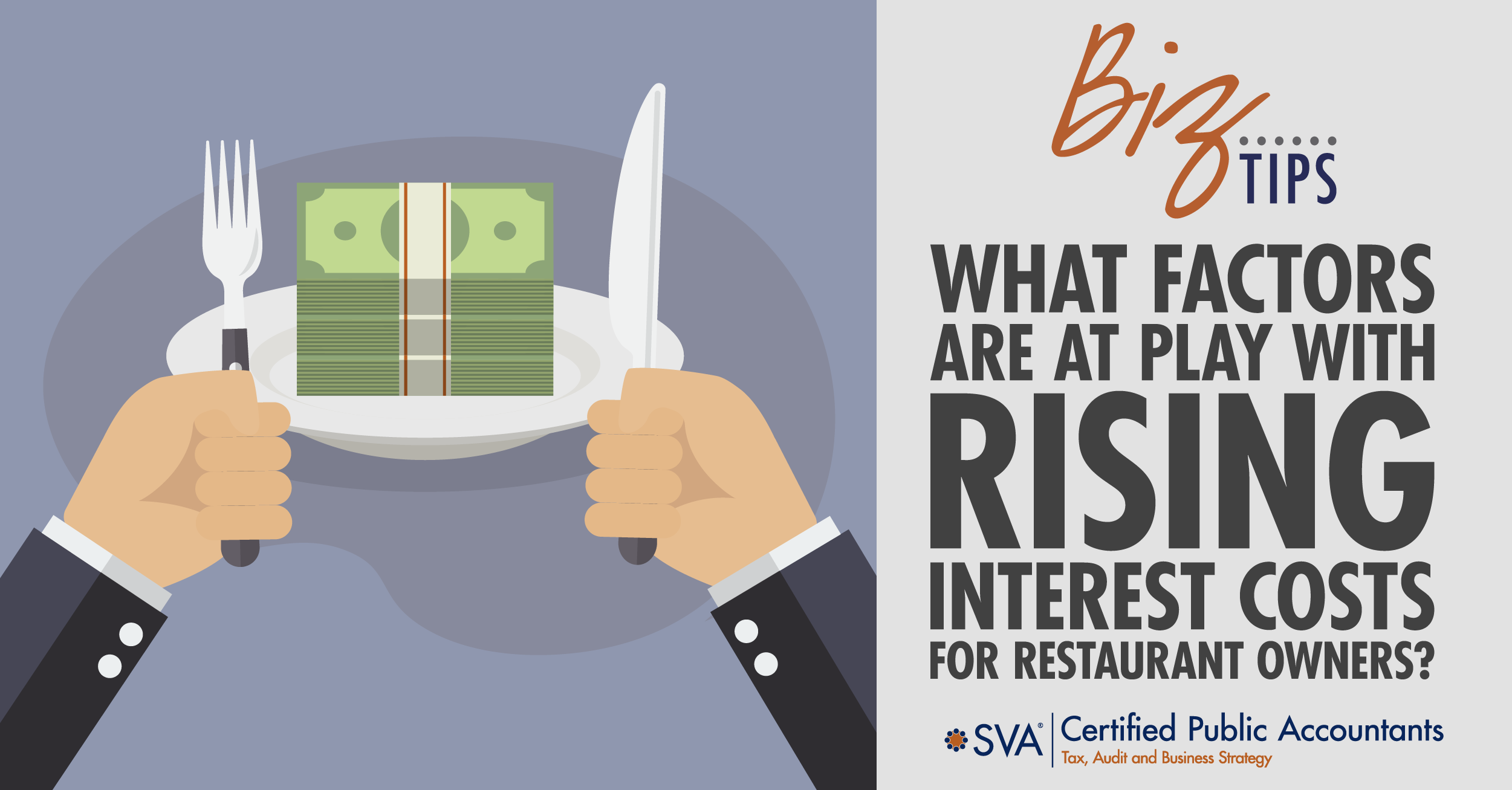| Highlights: |
- The article explains how rising interest rates increase borrowing costs for restaurant owners, making financing expansions, equipment, and operations more expensive.
- It describes broader impacts of higher rates such as reduced consumer spending on dining, lower property values affecting collateral, suppressed M&A activity, and increased operational costs.
- The piece suggests proactive strategies including refinancing debt, managing costs, diversifying revenue streams, loyalty programs, and monitoring cash flow to navigate a high-cost interest environment.
|
Rising interest rates can present a number of challenges for business owners, including those in the restaurant industry. Here are the key factors and implications associated with rising interest costs.
Factors and Implications of Rising Interest Rates
Increased Borrowing Costs
The most immediate and obvious effect of rising interest rates is the increased cost of borrowing. Whether a restaurant owner is looking to finance a new location, refurbish an existing one, or invest in new equipment, higher interest rates mean higher financing costs.
Reduced Consumer Spending
Higher interest rates can lead to higher monthly payments on variable-rate debts like credit cards and adjustable-rate mortgages. This can reduce disposable income for many consumers, leading to decreased spending on discretionary items, including dining out.
Impact on Property Values
As interest rates rise, the cost of financing real estate purchases increases, which can suppress demand and lead to potential decreases in property values. This is significant for restaurant owners who own their properties. Real estate is typically included as collateral on loans, and when it decreases, it reduces the borrowing capacity of the business.
Merger and Acquisition (M&A) Activity
Rising rates can reduce the attractiveness of leveraged buyouts or other debt-financed M&A activity, as the cost of servicing that debt becomes more expensive. This can suppress M&A valuations and deal volumes in the industry.
Increased Operational Costs
Some restaurants might have variable-rate loans for operational needs. Higher interest raises their operational costs, which in turn negatively impacts profitability.
Shift in Investment
As interest rates rise, safer investments like bonds become more attractive. Investors might shift their money from equities to bonds, reducing the availability of capital for businesses, including restaurants.
Strategies for Restaurant Owners
Refinance Debt
If possible, restaurant owners should consider refinancing existing variable-rate loans into fixed-rate loans, locking in the current rates before they rise further.
Cost Management
In an environment of rising costs, efficiency becomes even more important. Streamline operations, reduce waste, and consider leveraging technology for tasks like inventory management, reservations, and order processing. It is also imperative that you stay up to date on menu costs so you can accurately price your menu with the volatility in expenses impacting all menus.
Diversify Revenue Streams
Consider adding new revenue streams, such as catering, delivery, online sales, or even merchandise. This can help cushion against a potential drop in in-house dining.
Loyalty Programs
Encourage repeat business by establishing or enhancing loyalty programs. This can help mitigate the impact of reduced consumer spending.
Hedge Against Interest Rate Rises
Some financial instruments allow businesses to hedge against interest rate increases, potentially offering protection against sudden spikes.
Negotiate with Lenders
In some cases, it may be possible to negotiate terms with lenders, especially if you have a strong relationship and a solid track record. This also includes structuring the payments to be in your peak season to help with cash flow management.
Focus on Quality and Differentiation
Ensure that the dining experience you offer is of high quality and distinct from competitors. In tougher economic times, consumers may become more selective about where they spend their money.
Monitor Cash Flow
With higher costs, it's vital to keep to close eye on cash flow. Regularly review and adjust, if necessary.
Reconsider Expansion Plans
If you were considering a major expansion or new location, assess the potential returns in light of the increased financing costs and high construction costs. It might be more prudent to delay until conditions are more favorable.
Stay Informed
Economic conditions can change rapidly. Stay informed about interest rates, economic forecasts, and industry trends. This can help in making proactive decisions rather than reactive ones.
What is the Impact on the Multiples Based on Interest Rates?
When we discuss "multiples" in the context of businesses and particularly M&A (mergers and acquisitions), we're generally referring to valuation multiples.
For restaurants and most businesses, the common multiples are the EBITDA (Earnings Before Interest, Taxes, Depreciation, and Amortization) multiple, revenue multiple, and sometimes the P/E (Price to Earnings) multiple.
The impact of interest rates on these multiples can be profound. Here's a deeper look into the dynamics:
Impact on Multiples
Discount Rate and Present Value
At its core, valuation is about determining the present value of future cash flows. When interest rates rise, the discount rate used in discounted cash flow (DCF) models also increases. A higher discount rate reduces the present value of future cash flows, which can result in a lower valuation and, consequently, a lower multiple.
Cost of Capital
As interest rates rise, the cost of capital (both equity and debt) for a business usually increases. A higher cost of capital implies that for an investment to be considered attractive, it needs to produce a higher return. This can depress valuation multiples because potential buyers demand a higher return on investment.
Leveraged Buyouts
Many acquisitions, particularly in the private equity space, are financed through a mix of equity and debt, known as leveraged buyouts (LBOs). When interest rates are low, debt is cheaper, and this can inflate multiples since buyers can afford to pay more for a business. As interest rates rise, the cost of this debt financing increases, which can suppress the multiples buyers are willing to pay.
Economic Impact
As mentioned earlier, higher interest rates can dampen consumer spending. If the restaurant industry sees a slowdown due to reduced consumer spending, this can impact earnings and, by extension, EBITDA multiples. A perception of reduced growth in the industry can lead to buyers being less willing to pay high multiples.
Comparative Investment Options
When interest rates rise, fixed-income securities like bonds become more attractive. If potential investors or acquirers can get a better risk-adjusted return from these securities, they might be less inclined to pay higher multiples for businesses.
For Restaurant Owners
Understanding the potential impact on multiples is essential for restaurant owners, especially those considering selling their businesses or seeking external investments. A few takeaways for them include:
Timing
If interest rates are on an upward trajectory and an owner is considering selling in the near future, it might be advantageous to accelerate the process before rates (and consequently discount rates) climb further.
Debt Management
Given the potential for increased financing costs, restaurant owners should evaluate their capital structures and consider refinancing or restructuring debt if appropriate.
Operational Excellence
Regardless of the macroeconomic environment, businesses with superior operations, strong brands, and loyal customer bases will always command higher multiples. Focusing on operational excellence can help offset potential multiple compression from rising interest rates.
Don't Let Higher Interest Rates Keep Your Business Down
While rising interest rates can present challenges, proactive management and a flexible strategy can help restaurant owners navigate these economic shifts successfully. Interest rates are just one of many factors affecting valuation multiples.
While they do play a significant role, especially in capital-intensive industries or in businesses that rely heavily on financing, the underlying performance and prospects of the business remain paramount.
If you are a restaurant owner and have more questions regarding how your business can overcome high interest rates and look for ways to continue new projects and prepare for possible merger and acquisition scenarios, contact one of our professionals.
© 2023 SVA Certified Public Accountants

